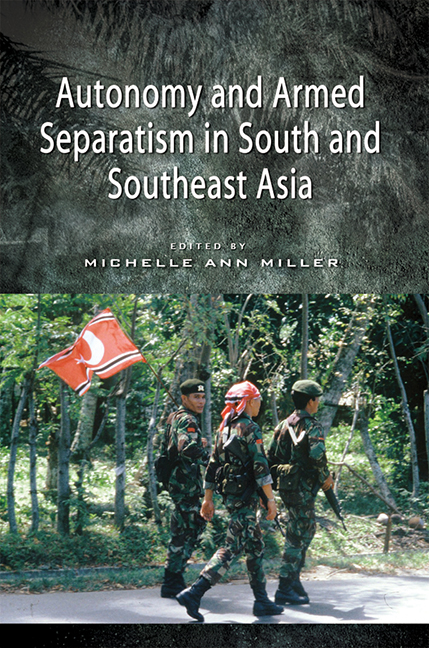Book contents
- Frontmatter
- Dedication
- Contents
- Acknowledgements
- About the Contributors
- 1 The Problem of Armed Separatism: Is Autonomy the Answer?
- 2 Mediated Constitutionality as a Solution to Separatism
- 3 Self-Governance as a Framework for Conflict Resolution in Aceh
- 4 Autonomy and Armed Separatism in Papua: Why the Cendrawasih Continues to Fear the Garuda
- 5 The Parallels and the Paradox of Timor-Leste and Western Sahara
- 6 Between Violence and Negotiation: Rethinking the Indonesian Occupation and the East Timorese Resistance
- 7 Struggle over Space in Myanmar: Expanding State Territoriality after the Kachin Ceasefire
- 8 Sri Lanka's Ethnic Conflict: The Autonomy-Separation Dialectic
- 9 Unitarianism, Separatism and Federalism: Competing Goals and Problems of Compromise in Sri Lanka
- 10 Autonomy and Armed Separatism in Jammu and Kashmir
- 11 Armed Conflicts and Movements for Autonomy in India's Northeast
- 12 Southern Thailand: The Trouble with Autonomy
- 13 The Last Holdout of an Integrated State: A Century of Resistance to State Penetration in Southern Thailand
- 14 Interlocking Autonomy: Manila and Muslim Mindanao
- 15 History, Demography and Factionalism: Obstacles to Conflict Resolution through Autonomy in the Southern Philippines
- 16 Conclusion
- Index
10 - Autonomy and Armed Separatism in Jammu and Kashmir
Published online by Cambridge University Press: 21 October 2015
- Frontmatter
- Dedication
- Contents
- Acknowledgements
- About the Contributors
- 1 The Problem of Armed Separatism: Is Autonomy the Answer?
- 2 Mediated Constitutionality as a Solution to Separatism
- 3 Self-Governance as a Framework for Conflict Resolution in Aceh
- 4 Autonomy and Armed Separatism in Papua: Why the Cendrawasih Continues to Fear the Garuda
- 5 The Parallels and the Paradox of Timor-Leste and Western Sahara
- 6 Between Violence and Negotiation: Rethinking the Indonesian Occupation and the East Timorese Resistance
- 7 Struggle over Space in Myanmar: Expanding State Territoriality after the Kachin Ceasefire
- 8 Sri Lanka's Ethnic Conflict: The Autonomy-Separation Dialectic
- 9 Unitarianism, Separatism and Federalism: Competing Goals and Problems of Compromise in Sri Lanka
- 10 Autonomy and Armed Separatism in Jammu and Kashmir
- 11 Armed Conflicts and Movements for Autonomy in India's Northeast
- 12 Southern Thailand: The Trouble with Autonomy
- 13 The Last Holdout of an Integrated State: A Century of Resistance to State Penetration in Southern Thailand
- 14 Interlocking Autonomy: Manila and Muslim Mindanao
- 15 History, Demography and Factionalism: Obstacles to Conflict Resolution through Autonomy in the Southern Philippines
- 16 Conclusion
- Index
Summary
The craving for autonomy in the Indian federal unit (hereafter called the “State”) of Jammu & Kashmir (J&K) has as much to do with the special circumstances in which the State acceded to the Indian union, as to the alleged manner in which the autonomy provided by the latter's constitution to the former (as a condition for the initial accession) has gradually diminished over the years. With an overzealous objective to integrate the State with India, and, more importantly, not to cede it to Pakistan, successive political parties/dispensations have tended to resist policies that sought to provide more powers to this State, sometimes disregarding popular aspirations in the region. The net result of this undermining of popular aspirations has been a home grown militancy since the 1980s, which, subsequently, has been sustained by neighbouring Pakistan. Even when there is some degree of realization in New Delhi that autonomy for J&K might be a good idea to address the problem of alienation among the people, the actual devolution of power remains a distant prospect on account of the complexity of political dynamics on the ground.
SPECIAL STATUS OF KASHMIR OVER TIME
J&K is no stranger to formal autonomy. At the time of India's independence from British rule in 1947, the predominantly Muslim J&K (according to some count, Muslims constituted 77 per cent of Kashmir's population), which was being ruled by a Hindu king Maharaja Hari Singh, was given the option of choosing to join Pakistan or India. The Maharaja chose to be with Hindu India. However, the terms of his joining clearly specified that he was surrendering only a limited jurisdiction of J&K to the Union of India. He put it on record that his government will not be bound by nor committed to any future constitutional changes in the Center-State sharing of jurisdiction beyond that which had been specified in the “Instrument of Accession”. Thus, Article 370 of the Indian Constitution bestowed a special status on J&K. If autonomy is understood to be a “device to allow ethnic and other groups claiming a distinct identity to exercise direct control over affairs of special concern to them, while allowing the larger entity those powers which cover common interests”, Article 370 provided autonomy for J&K in the following ways.
- Type
- Chapter
- Information
- Autonomy and Armed Separatism in South and Southeast Asia , pp. 177 - 195Publisher: ISEAS–Yusof Ishak InstitutePrint publication year: 2012

